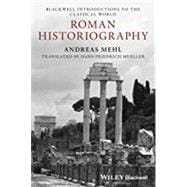- Provides an accessible survey of every historical writer of significance in the Roman world
- Traces the growth of Christian historiography under the influence of its pagan adversaries
- Offers valuable insight into current scholarly trends on Roman historiography
- Includes a user-friendly bibliography, catalog of authors and editions, and index
- Selected by Choice as a 2013 Outstanding Academic Title








